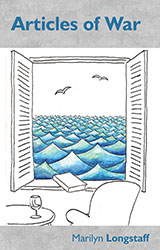Articles of War
Marilyn Longstaff
Price: £7.99

When Marilyn Longstaff’s Salvation Army Officer parents dedicated her to God, they promised to keep her from jewellery, finery and other worldly pleasures. At the age of fourteen, she signed the Army’s ‘Articles of War’, vowing to reject ‘the values of the world’, to be ‘a faithful steward’ of her time, body, mind and spirit, and to abstain from ‘all else that could enslave the body or spirit.’ Articles of War is a book about a jealous God, a fondly remembered childhood and English seaside holidays perfectly balanced between hope and disappointment. It is a book about a life haunted by ‘the ghost of a faith she’s lost’, about rules and hierarchies, belief and freedom and the small steps that pave the path to hell.
Some comments on Raiment:
‘A poet with an immense talent to engage and amuse. Longstaff is also brave enough to turn a peeled eye to life's disturbing realities.’
Peter Bennet
‘laugh-out-loud but mind-your-step poems, droll, thoughtful and completely without pretension.’
Bill Greenwell
Cover image: John Longstaff
My mother, in a fit of whimsy, locked us out, decided we should walk, like tradesmen, down the full length of the terrace – front, then back – to enter through the yard and scullery, keeping the new hall carpet pristine, child-free. One day, so tired from grammar school, I camped out on the front step, with my bags, my gabardine mack folded like a cushion; I rang, then rapped, then howled and cried, then sat – a battle of wills I’d never win. The minutes then the hours passed. Eventually, hungry, broken, cold, I had to give in. After some months, she altered the regime – forgot, couldn’t be arsed – picked some other weird and wonderful, meaningless power ritual. I chose defiance, Frank kept quiet, then left, Howard fled the country. What did I learn? don’t bother knocking find another way in power shifts there are no rules worth keeping.
On dedicating me to God, my parents pledged to keep me from harmful reading. My upbringing: READ. MARK. The Bible will provide everything you need, The Believer’s Bible – referenced for answers to all problems. Just the New Testament, mind, and possibly the law and the prophets, and a little smiting of enemies in pursuit of salvation. No sex and scandalous, adulterous kings sending the cuckolded husband into the front line of battle. Although I did some illicit peeking, aged 13, at the newly unbanned Lady Chatterley’s Lover, on the Canvey Island contract bus. ‘A’ level D.H. Lawrence’s Selected Essays proved the stumbling block, which after much prayer, Dad permitted for examination purposes. This began the rot. I still have a long way to go.
Perfect in miniature. Its crown, fabricated from plaited hat straw, lacquered black, spirals like an ammonite from centre to rim. Made by hatters who’ve plied this trade for years from Victorian high fashion to quaint replica. A fine tube of blood-red fabric circles the brim and maroon ribbon – three folds for Trinity – emblazons THE SALVATION ARMY in gold. And a deep navy silk ribboned bow, once tied is fixed. The chin strap shortened to fit her uniformed doll, now lost, like her Mum, whose proper bonnet she keeps too, like the ghost of the faith she’s lost.
I’m in the Mission Hall again in Stalybridge, ‘Come sister, just place your hand in the wound of our risen Lord’s side. Bring all your trouble and lay it down at his feet. Only one step…’ Another hour of this – I check my watch. Sweat on the minister’s brow, tiny beads of silver, washing away his sins. I need redemption. A silver beam of light pierces the chapel gloom, a bridge I run across, into the waking world, and watch the strands of my parallel teen world wound back in; wish I could find a way to sidestep this haunting time-shift trap. Trouble always resurrects my nightmare. Real trouble, like a mercury filling touched by silver paper, only to be endured. He’ll ask again. I step into my husband’s study. Glasses on the bridge of his nose, he asks, ‘Come with me,’ (a wound between us) ‘to visit my dying sister.’ Watch your step, girl. Too late now, check your watch, you don’t want to go, too much trouble, too many things to do before tomorrow, too wound up, trot out excuses, tongue slippery as quicksilver. My last resort, the usual quip, ‘a bridge too far’. He’s waiting on the doorstep. I keep up the tirade as we step out, just round the corner. I watch him type the security code. We cross the bridge into a world I don’t want to see. Trouble is waiting here, hiding its face behind silverhaired women in wheelchairs, pop-socks wound around ankles. I thrust my hand in the wound of my mother’s death bed. Only a step, to the right path, or 30 pieces of silver. Out from his wounded side – come sinner; watch your heavy burden roll away, all your trouble – rivers of mercy are flowing. Cross the bridge. The nurse troubles to check her silver watch, ‘Half an hour ago. I’m sorry.’ I step across death’s bridge; place my hand in the wound.
‘These poems keep you on your toes. They are both truthful and sly, seldom leading where you first expect. There’s a note of the surreal in the everyday, while a seam of comedy cracks plain things open. I found myself saying yes at almost every page, recognising things I hadn’t known or thought before.’
M.R. Peacocke
‘warmth and humour’
Write Out Loud